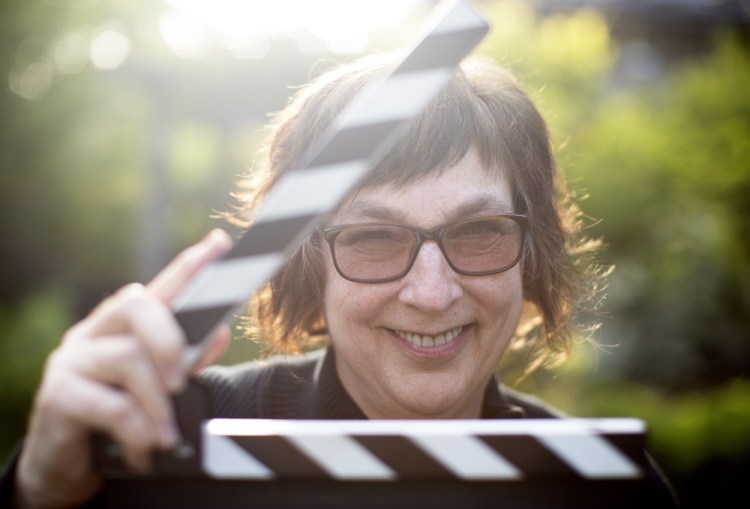Kate Kaminski has been making films in Maine for 25 years, even when she was pursuing a master’s degree in film production at Boston University. Fellow students’ films were mostly shot in Boston and had a big urban feel, she said, while hers “didn’t look like everyone else’s films, which was fun.”
Kaminski has produced films including “The Crew” and a film series called “Willard Beach.” She is continuing to produce films – “A Home for Women” will be released Friday in Augusta – and also teaches film courses at the University of Southern Maine and the Maine College of Art.
Her Bluestocking Film Series will be held July 17-18 at Space Gallery in Portland. Kaminski said the film festival is the only one in the world that requires films to pass the “Bechdel Test,” developed by cartoonist Alison Bechdel. To pass the test, a film has to have at least two named female characters who talk to each other about something other than men.
Q: Why did you start the festival?
A: I realized that Portland in the past had a couple of women’s film events here, but weren’t any longer. I just thought, there’s a gap and I’m going to fill that gap because it’s important.
It’s a one-of-a-kind thing, the only film event in the world that requires that all films feature a female protagonist and pass the Bechdel test. We’re the only ones who do that. There are a lot of film festivals that are called women’s film festivals, but they focus on the directors’ side. Our real focus is representation on screen and we want to really see a big jump in women’s stories and voices. We’re a solution to the problem of poor representation of women in films.
Q: Why is that important?
A: It’s important because I personally feel a lack of something when I go to the movies. I’m a huge film lover and I hope that for the film industry in the bigger world, some of these ideas will percolate up and we’ll see a wider range of expression, which right now seems pretty exclusively male. There are more films with women’s roles, but it’s far from a 50 percent split and we buy half of the movie tickets.
Q: How does a film with a women-centric approach differ from other films?
A: It doesn’t differ at all. Nothing is missing, and a lot of these films have male characters in them, but it’s a bit more unusual because there’s not a focus on male characters. We have, in past screenings, had a huge range of expressions and genres.
But it’s that female voice. That is, in a sense, suppressed by the film industry. There’s nothing missing and there’s a lot added. I’ve had people come up to me and say, “Oh my God, how amazing was that, to sit through all these movies with women in them doing all kinds of stuff that you just don’t get to see in standard fare at the theater?” It’s, “Wow! Look at all these women doing things.” We’ve been running a social media campaign to get men to support this idea of supporting women in movies, asking, “Are you a bluestocking guy?”
Q: Where does “bluestocking” come from?
A: Bluestocking became an idea around in the late 19th century and the early 20th century to describe people engaged in intellectual pursuits. It referred to men and women who were interested in a life of the mind, a life of the intellect and my feeling is that women don’t get a chance to show the intellectual side on screen. So I thought, smart, strong women on screen … bluestocking … I like it.
Q: Has the response been what you expected?
A: It’s been incredible. Every screening we have has proven we’re here to stay. Last year, we essentially sold out both nights. I think it’s going to be a really hot ticket this year.
Q: Does it have an impact beyond Maine?
A: It does, because we have a touring show of the best of the Bluestocking Film festival and it’s gone to Massachusetts and New York City. Sweden has film activists who have initiated a campaign called the “A rating” and we were the first film festival to get the A rating, indicating all the films passed the Bechdel test. Because they’re really pushing that over there. So, we’re popular in Sweden and that feels great.
Q: What about the future?
A: First and foremost, we want to screen more films every year and perhaps, one day, add a screenwriting competition and other features to the program. Next year, we’ll have a connection with a U.K. charity, an organization called the Matthew Martino Benevolent Fund (which supports filmmakers, actors and other performing artists). We’re going to give out an MMBF award this year – a “rising star” award, and we give prizes as well. Even though it’s not huge amounts, we hope someday it will be. We hope to continue to build on that and reach the bigger industry if we can. We think we’re making inroads and we hope next year to bring in an actress and a “Real Women Rule” award to the festival. I hope we become a destination festival. I think we have the bones to do it.
Send questions/comments to the editors.




Comments are no longer available on this story